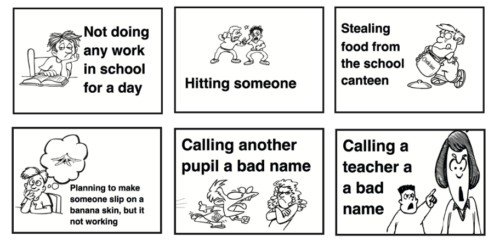Happy New Year! We’re kicking off this year of resources to support your P4C with “Back Stories” a technique you can use to add extra depth and a creative writing twist to any philosophical stimulus that invites an ethical judgement or decision. For familiarity, I’ll use The Naughtyometer which we shared in the last issue of 2023.
When asking children to make a judgement about a scenario, I’ll often ask, “What questions do you need answered before you can decide?” – in this case, decide how naughty each of these are.
They’ll ask, for example, “Was the work too hard for them?” and I might ask, “Why is that important?” to dig into the reason behind their question, before improvising some extra details. It’s a great way of getting them to think, “What if?” and to realise that it can be important not to rush to judgment without getting all the facts.

Here are some backstories you could use – but better to get the children to write them themselves. These are just quick and functional, but your strongest writers will enjoy elaborating on a story for a real audience.
Each group of five first sorts the cards on their face value, and then they each take two cards and give each a “Back Story” (which can, rather literally, be written on the back of the cards!). Then they share the back stories and sort again – do some seem less naughty now, and others more naughty?
Not doing any work in school for a day
“I’m Jamie. Yesterday, I didn’t do any work in school. I was just so worried about my dog, Max. He’s sick and I couldn’t stop thinking about him. Mr. Thompson seemed annoyed, but I couldn’t concentrate.”
Seeing someone hitting someone, and doing nothing
“I’m Alex. I saw Chris hitting Jordan in the playground. I wanted to stop it, but I was scared Chris would start picking on me too. I felt guilty, especially when Mr. Thompson asked if anyone saw anything.”
Hitting someone
“I’m Chris. I hit Jordan yesterday. I know it was wrong, but he made fun of me, and I just lost it. I didn’t mean to hurt him, but I was so angry.”
Hitting someone back
“I’m Jordan. When Chris hit me, I hit him back. I’d been teasing him, but he teases me and I don’t go mad like that.”
Stealing food from the school canteen
“I’m Mia. I took some apples from the canteen yesterday. Mom forgot to pack my lunch, and I was really hungry. If I said my mum had forgotten, they’d have given them to me, but I don’t want my mum to look like she’s not coping.”
Stealing someone’s lunch
“I’m Tyler. I took Jamie’s lunch because he always has a really nice lunch and I get jealous. I felt bad, especially when I saw Jamie looking for it. I was afraid of getting in trouble with Mr. Thompson.”
Forgetting to throw away a banana skin and someone getting hurt slipping on it
“I’m Ella. I accidentally left a banana skin on the floor, and later I heard that someone slipped on it. I was scared to tell Mr. Thompson it was mine. I didn’t mean for anyone to get hurt.”
Calling another pupil a bad name
“I’m Sophie. I called Tyler a name after I heard he took Jamie’s lunch. I just don’t understand why anyone would do something like that.”
Calling a teacher a bad name
“I’m Lucas. I called Mr. Thompson a mean name because he gave me extra homework. I didn’t mean for him to hear.”
Intending to make someone fall over on a banana skin, but the plan not working.
“I’m Ben. I thought it would be funny to put a banana skin on the floor so someone would slip, like in cartoons. I didn’t really want anyone to get hurt, just laugh a bit. But no one stepped on it. Mr. Thompson found it and told us about safety. I felt pretty silly and a bit guilty after that.”
A variation of the activity would be to get children to each write a different backstory for the same stimulus, and see how people respond differently to each of those.
Best wishes,
Jason & Tom